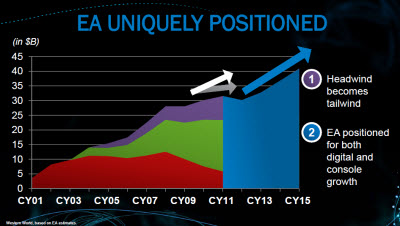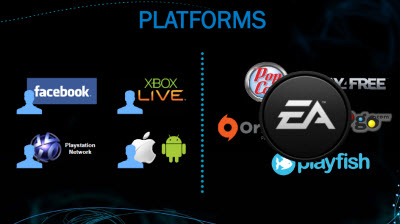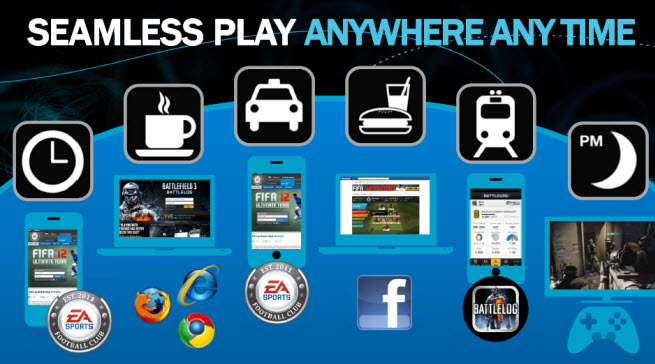GamesBeat: Does it also, say, lead you to want to do a lot of partnerships with other companies out there? Like, I don’t know, you could form an alliance of publishers that would ask the platform owners to make their platforms more open and universal, and that would help you out.
Segerstrale: I think we’re looking at everything at the moment. A lot of it is under our control in terms of some of the technologies we need to build. But we’re big believers in the future of a consumer experience that’s pretty radically different and evolved from what it is today. We’ll look back at this day when all these experiences were not connected as something pretty weird. So in order for us to enable that, yeah, we obviously have fairly close partnerships with these platforms or these ecosystems today.
GamesBeat: John Riccitiello had an interesting quote in a recent NPR story. He said, “consumers don’t want to be managed, they want to be entertained.” You’re putting together things that will help them be better-managed, it seems?
Taneja: No, no. Actually, it’s about entertainment, it’s about the scenario. I think consumers want to experience the game in a manner that is most comfortable to them, in bite-size increments when they’re traveling, on surround sound with HD production values and aesthetics when they’re on the console. They want us to be able to let them enjoy and interact with entertainment in that manner. In order to do that, we need to know who they are, and we need to have a connection with them.
Segerstrale: For us it’s about augmenting the art with the science. The numbers are incredibly important, the analytics and the telemetry and the underlying technologies and all that stuff, but it needs to be there to empower the beautiful, the inspirational, the surprising, the delightful for the consumer.
 GamesBeat: So you build a piece, make that go live in,. say, Tiger Woods, build another piece, make it go live in Madden or whatever? FIFA could build a lot of pieces, test them all and see if it’s really going to work, and then you roll all of those out over time? So you build each individual service where it makes sense for a game, and then you roll them out when you’re really ready?
GamesBeat: So you build a piece, make that go live in,. say, Tiger Woods, build another piece, make it go live in Madden or whatever? FIFA could build a lot of pieces, test them all and see if it’s really going to work, and then you roll all of those out over time? So you build each individual service where it makes sense for a game, and then you roll them out when you’re really ready?
Taneja: The way we’re doing that is, we are creating the capability, the feature. And we are exposing it through an applications programming interface (API). And the game, depending on the life cycle of where they are in development, then consumes it in order to create that experience. So if Madden is in the lifecycle where they’re under the hood, they’re able to now use this new API and have Madden NFL 13 have interoperability off the career mode, say. SimCity and SimCity Social, which are releasing a few months later, are able to consume more of the APIs and connect the loyalty, connect the player between the two experiences. We’re working very hard to expose these new capabilities as fast as we are building them, and then each of the games are able to pick them up and utilize them in their own lifecycles.
GamesBeat: You have maybe a couple of years to go, then?
Taneja: We are releasing code on a weekly basis, on a monthly basis, and a quarterly basis. So we’re not waiting to build the full thing in perfection. As it’s ready, it’s high quality, it’s got scale, it’s got reliability, we release it. Then we release the next piece. The architecture we have for this, it’s a very component-based type of architecture. It’s layered and it’s modular. As a piece and a component is ready, it gets exposed. The journey in this platform is ongoing, because you keep innovating, you keep adding new features, you keep adding new capabilities, these are all objects. And each of these objects can then be exposed and connected to the game at any point in which they are ready in the development process.
 GamesBeat: Platform owners can still do things that screw up universality. Even as they seem like they’re advancing, like the SmartGlass thing from Microsoft where you create these apps that can tie together the tablets, the smartphones, and the console, that’s more universal, but then you’re doing it for a Windows 8 platform, you’re almost tying yourself to that.
GamesBeat: Platform owners can still do things that screw up universality. Even as they seem like they’re advancing, like the SmartGlass thing from Microsoft where you create these apps that can tie together the tablets, the smartphones, and the console, that’s more universal, but then you’re doing it for a Windows 8 platform, you’re almost tying yourself to that.
Taneja: For those apps that are running on the Windows phone, exactly.
GamesBeat: So there seem to be many forces that will resist what you’re trying to do.
Taneja: I look at each platform to be a creative tool. So when someone is playing a game on the Xbox Live environment, they have an Xbox 360 and they have a SmartGlass application, we want to enhance and make that experience as high-fidelity, as beautiful as possible. We think that’s accretive to the overall pleasure that the gamer will get in that consumption of that entertainment. When they then move out of Xbox and into the car or into their office or they’re traveling and they want to continue some of those experiences, then we will add on to that, whether it’s Windows Phone or iPhone or Android or PC or social networks through the browser. So that’s how we’re looking at it. Make each experience as high-fidelity as possible, and then enable interoperability and bite-sized consumption on the go, on any device, at any time. So we see that as all working together for improving the experience of the gamer. We are very excited about the SmartGlass capabilities, we saw some concepts of that with Madden.
GamesBeat: So you’re bringing Silicon Valley into the games business?
Taneja: Yes, indeed. We are. We think of our platform at the same level of sophistication as, say, an Amazon or a Microsoft or a Google have. Both in terms of the quality of reliability and performance and security, but also in terms of the type of science that is going into this, the types of engineering. And therefore the talent we need, and the kinds of engineers we are hiring, are Silicon Valley, as you were mentioning. They’re augmenting the fantastic creative people we have in the company. I am personally in awe of the creative teams — we have the world’s best creative talent ever assembled. We are building the same muscle, if you will, on the other side of the coin, and the two together, we believe, will be a match made in heaven.
![]() GamesBeat 2012 is VentureBeat’s fourth annual conference on disruption in the video game market. This year we’re calling on speakers from the hottest mobile, social, PC, and console companies to debate new ways to stay on pace with changing consumer tastes and platforms. Join 500+ execs, investors, analysts, entrepreneurs, and press as we explore the gaming industry’s latest trends and newest monetization opportunities. The event takes place July 10-11 in San Francisco, and you can get your tickets here.
GamesBeat 2012 is VentureBeat’s fourth annual conference on disruption in the video game market. This year we’re calling on speakers from the hottest mobile, social, PC, and console companies to debate new ways to stay on pace with changing consumer tastes and platforms. Join 500+ execs, investors, analysts, entrepreneurs, and press as we explore the gaming industry’s latest trends and newest monetization opportunities. The event takes place July 10-11 in San Francisco, and you can get your tickets here.
VentureBeat's mission is to be a digital town square for technical decision-makers to gain knowledge about transformative enterprise technology and transact. Learn More
